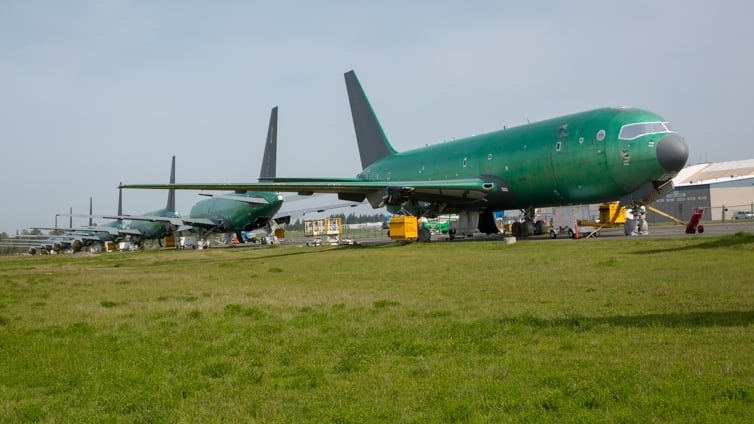EVERETT, Wash. — After about two years of delays, the Air Force on Friday will finally take hold of its first two KC-46 tankers, with many more at Boeing’s production facility ready to go.
About three tankers are set to be delivered to the Air Force every month this year, making it likely that the service could have a force of at least 36 KC-46 Pegasus tankers by the end of the year, Air Force and Boeing officials told reporters after a Jan. 24 ceremony marking the first KC-46 delivery.
But a major milestone called required assets available or RAA — which calls for the delivery of 18 certified KC-46s and nine wing refueling pods — will not occur until the summer of 2020, Air Force Secretary Heather Wilson confirmed.
RELATED

“We signed the acceptance on two of them, and we expect a rate of about three a month,” Wilson added.
Wilson’s comments follow a Jan. 23 report by Bloomberg News, which first reported that RAA had slipped to 2020 based on predictions by the Pentagon’s Defense Contract Management Agency.
Mike Gibbons, Boeing’s KC-46 program manager, was confident Boeing would quickly deliver the first 18 tankers to the Air Force due to the “nice, steady flow of production” that had been established over the past year.
Exactly when the wing aerial refueling pods, or WARPs, will be available to deliver is a fuzzier proposition.
Sean Martin, Boeing’s chief aerial refueling operator, said that Boeing continues to work “very, very hard” with WARP manufacturer Cobham to get the pods ready to be certified by the Federal Aviation Administration — a first for an Air Force tanker, which normally are only qualified within the military and not to civil standards.
“We’re working through to be done by the end of 2019. The Air Force will decide when they are ready to accept the first pods,” Martin said.
Gibbons reiterated that Boeing was working to wrap up FAA certification for the refueling pods this year.
“RAA is something we’re still in discussion with the Air Force about,” he said. “Until we finish that discussion, I can’t give you a date.”
During the delivery ceremony, Boeing Defense CEO Leanne Caret made a surprise announcement that the company would deliver not one, but two tankers to the Air Force tomorrow.
“The Pegasus is defined by three words: capability, efficiency and affordability," said Caret. “It is equipped with the most advanced technology to fulfill the Air Force’s most critical needs to fuel cargo, to travel passengers and carry patients.”
Boeing’s delivery of the KC-46 to the Air Force marks a major milestone for a program that is about two years behind schedule and $3 billion over budget. And although officials sounded an optimistic note about the future of the program during the delivery ceremony, the first tankers will be accepted by the Air Force despite a number of flaws with the aircraft’s boom and the remote vision system that allows the boom operator to safely guide fuel from one aircraft to another.
Under the company’s fixed-price contract with the Air Force, Boeing is required to pay for cost overruns, further incentivizing Boeing to get the program on track.
Boeing has 52 KC-46 aircraft currently under contract, with about a dozen jets fully complete and several more closely following, Gibbons said. The first four KC-46s are headed to McConnell AFB, while the next four will fly to Altus AFB, Okla.
“Those four at McConnell are needed for them to start their operator training and to get familiarized with the jet. We’ll deliver to Altus Air Force Base in February,” he said.
Valerie Insinna is Defense News' air warfare reporter. She previously worked the Navy/congressional beats for Defense Daily, which followed almost three years as a staff writer for National Defense Magazine. Prior to that, she worked as an editorial assistant for the Tokyo Shimbun’s Washington bureau.








